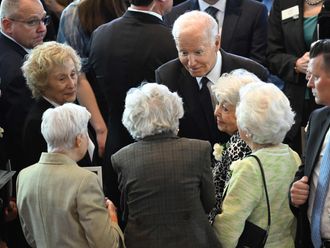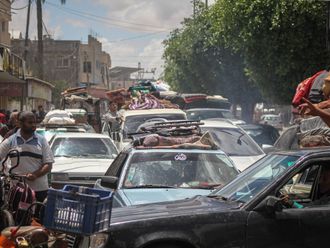Istanbul: One of Turkey’s most prominent anti-government journalists was attacked early on Thursday outside his home in Istanbul, raising fears over the security of media figures who taken a critical line against President Recep Tayyip Erdogan.
Ahmet Hakan, a respected columnist for the Hurriyet daily and a TV show host on CNN-Turk who has faced death threats, was hospitalised after sustaining injuries to his ribs and nose.
A gang of four attacked Hakan shortly after midnight outside his home in the upscale Nisantasi district of Istanbul, Hurriyet said.
After hosting his late-night show, Tarafsiz Bolge, Hakan left the shared headquarters of CNN-Turk and Hurriyet in a private car along with his driver and bodyguard, it said.
One of the assailants held off his bodyguard and the other three beat Hakan before fleeing in their car.
Police detained all four suspects after a hot pursuit, Hurriyet said.
The attack on Hakan sparked widespread condemnation and fresh concern about deteriorating press freedoms in Turkey, which is gearing up for a snap November election, its second in five months.
In a message relayed by Hurriyet editor-in-chief Sedat Ergin, Hakan said: “Such attacks will never intimidate us. We are not afraid of anything. We will continue to walk on the path we have chosen.”
Ergin said it was an “organised, planned attack,” because the assailants had followed Hakan after he left his office.
The US embassy in Ankara said in a tweet: “Those who seek to intimidate journalists with violence are fighting a losing battle. Free speech cannot be beaten into silence.”
In a series of tweets in Turkish, the British ambassador to Turkey Richard Moore also denounced the “unacceptable” attack, saying: “No one should be threatened and subjected to violence.”
Kemal Kilicdaroglu, the leader of the main opposition CHP, said: “It is our greatest desire that the government should take careful and coherent steps regarding these attacks aimed at the media.”
Some government officials also condemned the attack, with Deputy Prime Minister Numan Kurtulmus saying: “The circumstances surrounding this attack will be brought to light with the utmost clarity.”
There has been growing concern about deteriorating press freedoms under Erdogan, in particular over the numbers of journalists facing legal proceedings on accusations of insulting top officials.
Tensions have risen further as the government wages a relentless campaign against Kurdish militants, with officials accusing critical journalists of taking the side of “terrorists”.
Hakan has been the target of threats by pro-government media columnists for his criticism toward the government and had already asked for police protection.
Cem Kucuk, a columnist for the staunchly pro-government Star, threatened Hakan with “crushing you like a bug” and said: “It’s only because we’ve been merciful until now that you are still alive.
Can Dundar, the editor-in-chief of opposition Cumhuriyet daily, singled out Kucuk as “the primary suspect behind the attack”.
Hakan spoke out against the ruling Justice and Development Party (AKP) on his show and criticised AKP deputy Abdurrahim Boynukalin who led a mob that attacked Hurriyet offices last month.
The Hurriyet headquarters was twice attacked by pro-government demonstrators who accused the paper of misquoting Erdogan on his comments on Turkey’s recent unrest.
“Who are you? Are you a bandit?” Hakan asked Boynukalin.
The MP was filmed delivering a fiery speech outside the Hurriyet office after the attack on the daily and was filmed in another video purporting to explicitly threatening Hakan and calling him a “a big coward”.
But following Tuesday’s assault, Boynukalin denied the attack was linked with him or his party.
“We are not so deceitful as to send four men to beat a journalist in front of his home,” Boynukalin wrote on Twitter.
Hurriyet and CNN-Turk are owned by Dogan Media Group, which has repeatedly been criticised by Erdogan and does not always follow the government line.
Reporters Without Borders ranked Turkey 149th out of 180 in its 2015 press freedom index released last month, warning of a “dangerous surge in censorship”.












